From gun violence and police brutality to sexual violence and harassment, young people – in all their diversity – around the world are living in violent realities. Yet, in a new wave of human rights activism, these young trailblazers are rising up, taking action and calling for change, while juggling school, university, and jobs.
AFRICA
“Seeing people take action feels good” – Haafizah Bhamjee, 22, South Africa
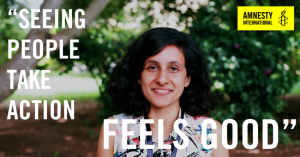
Period poverty exists, especially at university. You can’t even talk about menstruation, let alone whether you can afford sanitary products, so girls suffer in silence. It’s dehumanizing.
My friends and I are trying to change this, through our #WorthBleedingFor campaign. Most people think university is a luxury for the rich, but it’s not. Poor people go to university too. Some students sleep in the library, others line up to receive grocery packs, while lack of access to sanitary pads is a real problem. We’re pushing for universities to install sanitary pad dispensers in bathrooms, we’ve contacted the local government to provide free pads for girls in schools and we’re encouraging girls to speak about their experiences.
Seeing people take action feels good. The change is gradual, but it’s exciting. Just recently, a group of girls made a video about #WorthBleedingFor showing our campaigning work. Knowing we’d reached out and had an impact was amazing.
I am inspired by… Winnie Mandela. She was fiery, driven and never stopped campaigning.
Twitter: @FizzerBlack
“To be an activist, one must stand up against social injustice” – Shafee Verachia, 26, South Africa
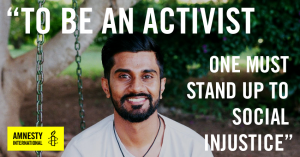
Student fees are continually rising, and it is systematically excluding bright young minds. This is why, like thousands of other young South Africans, I was part of #FeesMustFall protests – the largest student-led movement in South Africa since the Soweto uprising of 1976, where black school kids stood up to protest against apartheid. In October 2015, we embarked on a systematic shut down of our university system.
Over the course of two years (2015-2016), we experienced police brutality, victimization and demonization. My friend, and successor as Student Representative Council President, Shaera Kalla, was shot in the back 13 times, at close range by policeman firing rubber bullets. She was unable to walk for almost six weeks. Another student, Kanya Cekeshe, was sentenced to eight years in jail. Hand-grenades were thrown at us and tear gas was fired. I still bear the psychological scars of what I experienced.
Even though our call was eventually met with a favorable response and tuition fees were not increased, it left me feeling agitated and angry. Change is not an event, it is a process and this process is not happening fast enough. Young people need to be at the forefront of shaping change. For too long youth issues have been on the periphery while leaders have been fixated with power and holding on to it. When the youth realize that we have the power and agency to shake the core of the system, we could be an unstoppable force for social justice
I am inspired by… the youth activists who rebel against a system that ignores and excludes them. It’s these young people who give me hope and make it clear our struggle must continue. As long as there are young people who are going to sleep hungry, can’t afford to go to school or are unable to access their most basic rights, our work must continue.
Twitter: @ShafMysta
“Human rights activism saved me” – Sandra Mwarania, 28, Kenya
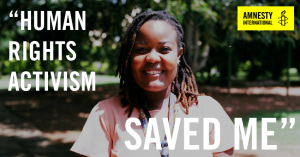
I used to think human rights advocacy was just for professionals with a strong legal background. It’s not.
At university, students aren’t listened to. When I was a student, I advocated for students to have an active, powerful voice on issues that mattered to them. Campaigning for youth rights was fun and inspiring. As a young person, I wanted to campaign for positive change.
We go to university to carve successful career paths. However, students are confronted with harsh realities of joblessness, corruption, discrimination and a host of other injustices. I experienced this first hand when I left university. Instead of giving in to hopelessness, I volunteered with social justice initiatives.
I am 28 now and a year into my first stable job. Now I have a job, I feel as though I need to hold on to it and I’m grateful for my current role complements my volunteering work. In a way, human rights activism saved me.
Seeing the impact my work is having makes me feel good and it encourages me to keep going. If people try to bring me down, I smile and ignore them. I know my story and I know where I want to go.
I am inspired by…. Amnesty International Kenya’s Country Director – Irũngũ Houghton. Since he joined the team this year, my work ethic has shifted. He constantly coaches me to challenge myself as a human rights defender and young leader.
Twitter: @SMwarania
AMERICAS
“The only way to heal was to take action” – Jaclyn Corin, 17, US
I never imagined it would happen to me. Parkland was labelled the safest community in Florida, but when tragedy hit and a mass shooting took place at school, I knew the only way to heal was to take action.
When my friends and I came together, we didn’t have a plan. We literally started work on a living room floor. Being young worked in our favour. We weren’t adults trying to guess what worked for young people and we weren’t asking for permission. Other kids from across the nation saw what we were doing and felt they could do it too.
Being survivors of a school shooting meant people listened to us. We were angry and loud. The reaction to what happened to us helped build our movement faster than we could have imagined. It is amazing to see the impact we’re having, but there’s also a sense of guilt, as this has arisen out of something so horrible.
We created March For Our Lives because our friends who lost their lives would have wanted us to take action. We’re doing it for them.
I am inspired by… the kids who are doing something to make a difference – the girl who is running for school board, or the others running March For Our Lives. It’s the people and the present that inspires me.
Twitter: @JaclynCorin
“We’re not afraid, we know what we’re doing is right” – Matt Deitsch, 20, USA
March For Our Lives was created because something had to change. The Parkland shootings marked my sister’s birthday, Valentine’s Day. She was at school. When I heard about the shooting, I tried to contact her, but she wasn’t answering. I went to her school, trying to figure out what had happened. My sister survived, but in that moment, I knew the situation had to change.
Everything we’ve done since February 14 has been based on what we think is right. So far, it’s worked. We’ve organised trips to lobby state representatives, held a student town-hall with CNN, where numerous young people came together to speak out, and organised the March For Our Lives, which saw over 800 marches take place in numerous countries.
Lots of people want to make out like we’re something special, but we’re just normal kids willing do something about this problem. It’s crazy to see the tangible difference we are making. So far, we’ve seen 25 new laws passed across 15 states. It’s one thing to see a shift in mentality, but to see something being done to actually save lives is on a different level.
We’re not afraid, because we know what we’re doing is right. We carry on because many people who died in the Parkland shooting made a conscious effort to save someone else. We’re just trying to perpetuate that.
I am inspired by… other students who take a stand, such as Jaclyn. There’s a wonderful senior named Caitlin who organised a protest in Ocala, Florida, an area where there’s loads of gun stores. More supporters attended her rally than the governor’s.
Twitter: @MattxRed
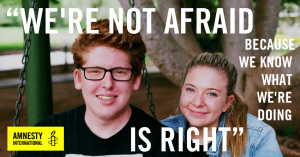
“Violence in my community must end” – Raull Santiago, 29, Brazil
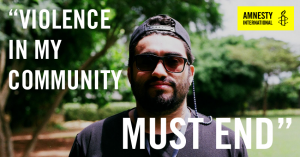
There are two sides to life in a favela. On one side, there’s a strong sense of community. On the other there is police violence, fuelled by inequality and racism. Every day people are violently murdered because of the colour of their skin.
I’ve seen a lot of violence in my life, with many young people imprisoned or murdered. Others are forced into the criminal underworld just to survive. In Brazil, there’s a national discourse around the drug problem and how the authorities are choosing to combat it through violence. In my community, 12 people have been murdered in the past two months.
I don’t want to sit by silently. As a human rights activist, I am determined to campaign against the ‘war on drugs’ and call for an end to violence in my community. We’re holding demonstrations in the street and staging street theatre to get our message across. I firmly believe these small actions will get our message across to a wider population.
People used to stay silent when someone was killed, but that’s not the case now. Every day, we fight for our lives. It’s a violent reality. My tattoo reads ‘Believe’. Even though it’s hard to have faith, my tattoo is a reminder of how far we’ve come.
I am inspired by… simple down to earth people, such as my mother, father and friends. They’re living the same reality, but are continuing to fight to improve things. Despite the hardship, they still smile. That’s a real inspiration.
Twitter: @raullsantiago
“I have a voice and I am not afraid to use it!” – Zachir Enrique José, 18, Chile
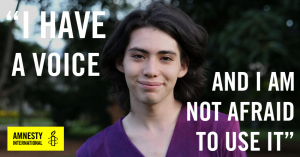
Young people are constantly told they don’t know their own reality. It’s very frustrating. I identify as non-binary. People don’t know who we are. We don’t exist in language or everyday life. We’re assigned a gender by force, but we don’t get a say in it. When I told my family I was non-binary, they didn’t understand.
I want to make sure young people know their sexual and reproductive rights. Through workshops, festivals, books and fanzines, I am educating young people about their rights. It’s not for everyone, but most people thank me after the workshop. These issues aren’t often spoken about in Chile and when we do speak about them, it’s done in a way that makes them happy.
As a human rights activist, I will continue to raise my voice. I am resilient. Yes, I’ve experienced difficulties, especially as so many people treat sexuality as a joke, but there are people with empathy, so we will continue to empower each other. I have a voice and I am not afraid to use it.
I am inspired by… activists across my network!
“Sexual violence happens so often in Peru, people think it’s normal” – Yilda Paredes, 23, Peru
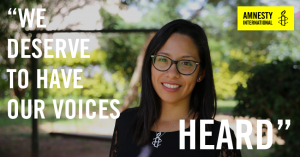
Behind our smiles, there is fear. A fear of living a life filled with violence.
In Peru, girls and young women are unprotected. We’re not allowed to have an abortion, apart from in exceptional circumstances. Just recently, a man burned a young girl alive in a bus. This happened near to my house.
I have been a victim of harassment. My ex-boyfriend used to stalk me. He threw rocks at my house, followed me everywhere and started rumours. I was forced to change my mobile number and the way I live. I even considered dropping out of university.
I found strength through my friends as well as my work with Amnesty International. When people found out about my situation a lot of girls and women started coming to me for advice, saying they’d experienced similar situations. Sexual violence happens so often in my country, people think it’s normal.
I am now training to be a lawyer and I am a human rights activist, campaigning on issues such as women’s rights, LGBTI rights, and indigenous people’s rights. There are many of us who want to see a change in our community. We deserve to have our voices heard and respected.
I am inspired by… women such as human rights defenders Maxima Acuna, from Peru, and Marielle Franco, from Brazil, who was shot dead earlier this year. They both fought for our rights.
Twitter: @ParedesYilda
“Everyone deserves the opportunity to learn about their rights” – Karin Watson, 21, Chile
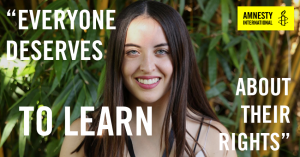
Becoming a human rights activist was a natural process. I’ve been interested in social justice issues since I was 12. From 1973 to 1990, Chile was under the Pinochet dictatorship and there were a lot of human rights violations. Learning about the history of my country inspired me to become a human rights activist. Now I work on issues such as youth, migration and sexual and reproductive rights.
In Chile, girls and women are not allowed to have an abortion and many have died because of it. Last year, the National Parliament passed a ruling, stating abortion would be allowed in some circumstances. It was a great victory, but right after the bill was passed, a new government came into power and limited its impact. Amnesty International is educating young people on this issue through its My Body, My Rights campaign and it’s having a huge impact. It’s beautiful to see how it’s developed.
Nowadays, I work on human rights education, teaching children about their rights. It fills my heart and gives me motivation. Everyone deserves this opportunity. As part of Amnesty International’s Youth Collective, I am working on youth issues at a global level. It’s inspiring, as I’ve met so many people and made so many new friends, which means our work reaches new places.
I am inspired by… my friends, those who I met through this work and along the way. My friends who work on My Body, My Rights, are younger than me, but they’re so strong and passionate. They travelled to remote areas of Chile to educate people. It’s very inspiring.
ASIA
“By standing together, we can inspire each other” – Kania Mamonto, 25, Indonesia
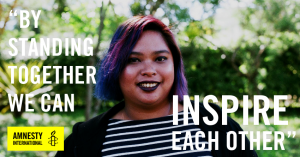
At least half a million people were massacred during the 1965 tragedy in Indonesia, and it’s my job to document stories of the survivors. I organize community survivor groups and bridge the gap between generations. It’s important young people understand our country’s past. As a human rights activist, I don’t want to see injustice. I want to work with others, share knowledge and take action, but being a human rights activist isn’t easy in Indonesia.
Last April, I was part of a cultural event alongside numerous other human rights defenders. I was Master of Ceremony. A violent group came and barricaded us into the building for eight hours. It was terrifying. More than 200 people were trapped, including children. They used rocks to smash the glass, we were fired at and were at risk of being beaten. After we were released, my face was splashed all over the media.
The whole incident was very traumatizing. I work so hard to make change possible, but that’s not how it’s perceived. I’ve learnt to deal with what happened and I want to educate people about my work. If people have an issue with it, I want them to talk to me and have an open discussion. Standing up for what you believe in doesn’t make you a bad person. We just want justice and equality.
Through Amnesty International, I’ve met and worked with other human rights defenders from across Asia and it’s good to feel part of a global network. It’s an opportunity to share the work we’re doing, as well as our problems and the lessons we’ve learnt. By standing together, we can inspire each other.
I am inspired by… an Indonesian activist called Munir. He was so inspiring, brave and always told the truth. He stood with the people.
Twitter: @Kanimonster_
“When I speak out, I feel empowered” – Manu Gaspar, 23, Philippines
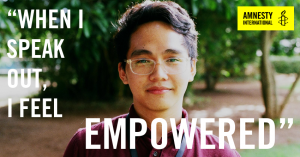
When I speak out, I feel empowered. Making my voice heard was something I struggled with growing up. I told my parents I was gay when I was 19. Compared to some of my friends who came out, I am lucky, as I am still able to live at home.
It’s not always easy, though. My parents don’t approve of my sexuality and it’s hard to find common ground. Most of the time when I go home, I don’t talk to anyone.
I’ve found hope through human rights activism. When I talk about issues I am passionate about, I feel appreciated, as though I am making a difference.
Youth human rights activism plays a huge role in my life. Alongside my role at the United Nations Population Fund (UNFPA), I am also part of Amnesty International’s Youth Collective. So many young people face similar struggles and it’s an opportunity to share my story with others and tell them it gets better – and once it does, it’s a responsibility to ensure other queer people everywhere enjoy their freedom as much as you do. It takes a long time to know yourself, but it helps when you find people who you want to talk to; they become your chosen family. When you find that group, you see things from a different perspective and feel much more appreciated.
I am inspired by… the LGBTI community. Many people had it much harder, and I wouldn’t be able to be myself if it wasn’t for them.
Twitter: @mnugaspar
“People should be tolerant and open-minded” – Amal Agourram, 21, Morocco
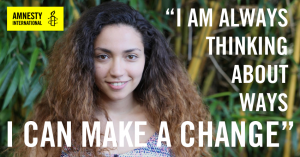
Women’s rights are violated every day in Morocco. I know people who have been harassed and assaulted, whose right to freedom of expression has been violated, and those who have faced unfair trials. That’s what makes me want to fight for human rights.
After I graduated, I started working with Amnesty International at a local level on its Brave and I Welcome campaigns.
My aim is to create an environment where people are tolerant, open-minded and there’s an understanding of human rights. Through I Welcome, I encourage people to see beyond the refugee label and listen to the stories behind it.
I mostly work with other young people on these campaigns. It’s an opportunity to meet people who have had similar experiences. By taking part, young people tell me they feel a lot less lonely and part of something important. Many of us have also used the skills we’ve gained to educate people at home, about issues such as women’s rights.
I am always thinking about ways I can make a change and have an impact. For me, it’s a hobby. Even when my parents tell me to rest, I tell them that promoting the importance of human rights makes me feel good!
I am inspired by… Nelson Mandela. He inspires us all. I also seek inspiration from people from my hometown. They motivate me to make a difference.
EUROPE
“We can change the way someone looks at the world” –Mariana Rodrigues, 22, Portugal
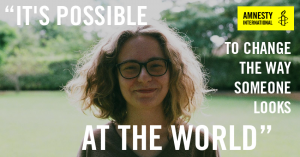
My dad is a bit of a revolutionary. He taught me to think outside the box, so when I see something I want to change, I do something about it. All my activism is based around this.
When I went to university, I was approached by an Amnesty International fundraiser. The organization’s work was so inspiring, I decided to become a face to face fundraiser after I graduated.
Fundraising provides an opportunity to change the way people think and to educate people about what’s going on in the world. I talked to a lot of people who had different ideas about refugees. After we spoke, they realized the importance of welcoming people into Portugal. It proved that most of the world’s problems stem from a lack of information. It is possible to overcome hate
It’s possible to change the way someone looks at the world and Amnesty, as well as my sustainable clothing project, provides a way of doing this. It’s incredible to be part of a youth network that provides an opportunity to meet activists from all over the world.
I am inspired by… people who continue to speak out in places where it’s hard to do so.
Amnesty International held its first-ever Youth Power Action Summit, earlier this year which saw more than 100 young people from around the world share stories, ideas, and skills.


